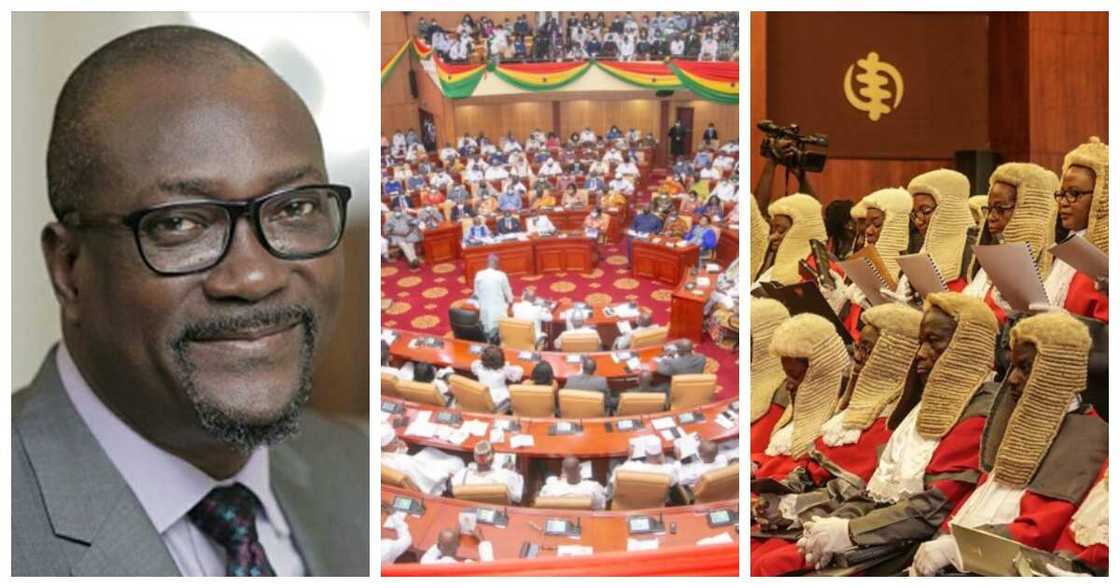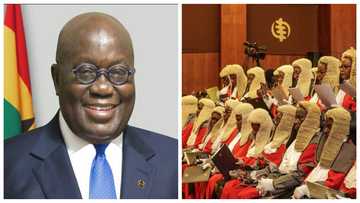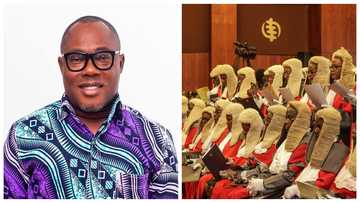CDD Boss Prof Kwasi Prempeh Defends Supreme Court Ruling On Deputy Speakers’ Vote While Presiding
- Centre for Democratic Development's Prof Henry Kwasi Prempeh, has said the recent ruling by the Supreme Court on the voting right of presiding deputy speakers is apt.
- The head of the governance think tank has described the ruling as a straightforward, clear, and correct decision that is consistent with the Constitution.
- Prof Prempeh also said the fact that Parliament has been doing something for a long time does not make it constitutionally right.
PAY ATTENTION: Click “See First” under the “Following” tab to see YEN.com.gh News on your News Feed!
Executive Director of think tank, Centre for Democratic Development (CDD-Ghana), has backed a recent decision by the Supreme Court that allows deputy speakers presiding in Parliament to vote on matters.
The position of Prof Henry Kwasi Prempeh is markedly different from many in the civil society space who see the ruling as a controversial call.

Read also
Bagbin strikes: Akufo-Addo’s comment on Supreme Court ruling on deputy speakers’ vote myopic
The CDD-Ghana boss took to Facebook last Saturday, March 12, 2022, to state that while he is an advocate of Parliament’s capacity to check the Executive, the ruling by the Supreme Court was a “simple, straightforward, clear, and correct decision as a matter of constitutional interpretation and analysis.”

Source: Facebook
“The Court's judgement is faithful to the text and structure of the Constitution…” he added.
Enjoy reading our stories? Join YEN.com.gh's Telegram channel for more!
He explained, for instance, that the fact that Parliament has for many years barred deputy speakers presiding temporarily as Speakers from taking part in voting does not make the practices constitutionally appropriate.
“No matter how longstanding a practice, its constitutionality cannot be established or presumed until and unless it is challenged in an appropriate constitutional case,” he stressed.
His views sharply contrast those of Prof Stephen Kweku Asare (aka Kwaku Azar) who has described the ruling as an unfortunate interference of the Judiciary in the affairs of the Legislature.
The US-based private legal practitioner said last week that the standing orders of Parliament are a distinct body of law and should not be interfered with by the Judiciary.
Ghana’s Supreme Court stirred controversy when a seven-member bench ruled that a deputy speaker, while presiding over proceedings in Parliament, has the right to vote on matters and be counted as part of the quorum for decision-making in the House.

Read also
‘No arm of government is above the law’ – Akufo-Addo backs Supreme Court decision on deputy speakers
The judges ruled unanimously that upon a true and proper interpretation of Article 103 and 104 of the 1992 Constitution, a deputy speaker who assumes the temporary role as Speaker of Parliament does not lose his right to take part in decisions.
The matter of the voting right of the deputy speaker while they are presiding in Parliament was taken to the Supreme Court for interpretation by a law lecturer.
Justice Abudlai went to the Supreme Court to seek clarification over the matter following the chaos that ensued in Parliament when First Deputy Speaker, Joseph Osei Owusu, counted himself as part of a quorum to approve the 2022 budget.
Prof Gyampo Proposes Review Of Supreme Court Decision On Deputy Speakers’ Vote To End Controversy
Meanwhile, Prof Ransford Gyampo has proposed a review of a ruling by the Supreme Court on the right of deputy speakers to vote while presiding in Parliament.
The Supreme Court stoked controversy when a seven-member panel of judges decided that deputy speakers temporarily acting as Speakers of Parliament do not lose their right to be counted as part of the quorum for decision-making in the House.
Prof Ransford Gyampo, a senior political science lecturer at the University of Ghana, has said in an opinion piece on Facebook that while the apex court has not erred by ruling on a matter that was brought before it, a review of that ruling has become necessary.
Our manifesto: This is what YEN.com.gh believes in
Source: YEN.com.gh


